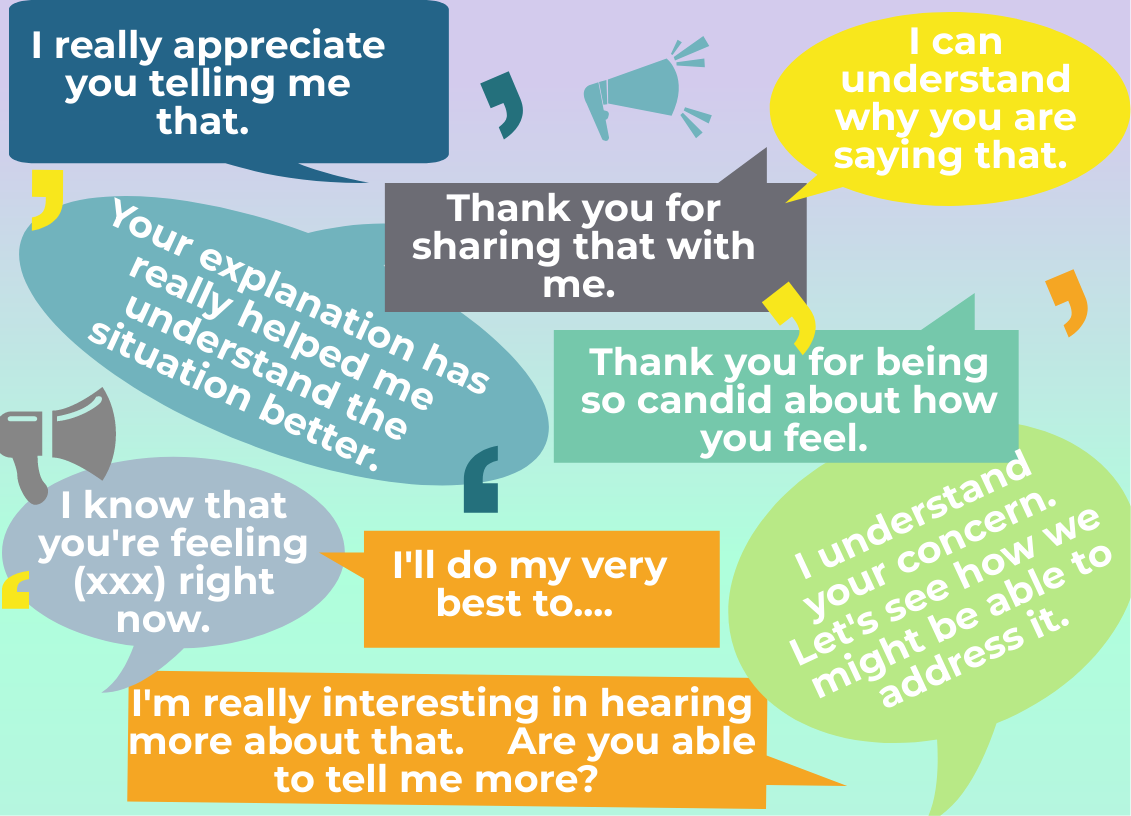Training South West Blog
10 Great Tips to Manage Difficult Conversations
If so, you'll appreciate how emotionally exhausting and challenging these conversations can be. The challenge is particularly difficult if your conversations take place via the telephone due to the lack of body language and visual cues.
However, by planning your approach and adopting appropriate strategies, you can reduce the emotional impact of difficult conversations and deliver better outcomes.
Below, we've outlined ten tips to get you started:
Tip 1: Preparation is everything
If you aren't caught unawares and have the luxury of being able to plan your conversation, then planning is everything. Consider the purpose and objectives of the conversation and plan your approach. What do you want to get out of it? Are there any areas you can compromise on? Are there any red lines in this situation or areas that cannot be compromised?
Next, consider the likely purpose and objectives of the person you will be speaking to. Are there likely to be any gaps? Do you need to reconsider your approach so that it also covers their needs?
Ensure you write your plan down. This will help anchor you to the necessary topics of the conversation, provide structure, and stop you from going off on tangents.
Tip 2: Consider the Setting
If your conversation takes place face-to-face, select an environment that is relaxed and private. Don't, for example, manage a difficult conversation in an open-plan office setting.
If the conversation is due to take place via the telephone, ensure you're in a quiet environment, free of potential disturbances, and manage the call at a suitable time. Choosing to call someone late in the day when they are likely tired will further heighten their frustrations.
Tip 3: Open the Call or Meeting with Positive Language
Ensure your language is calm, positive, and respectful. It's a good idea to ask how someone might like to be addressed at the outset. For example, should I call you Mrs Payne, or, would you prefer me to use your first name?
Be mindful of the words that you use, for example:
• Words such as 'but' for example, are contradictory. They suggest that you would like to do something, but that you're not going to. Rather than, 'I'd love to help but I've got a meeting shortly', try, 'I have a meeting planned, and as soon as it finishes, I'll help you'.
• The use of the word 'no' can shut a conversation down very quickly and set a negative tone. Instead, consider language such as, 'I'm not sure if that would be possible. Perhaps we can explore some alternatives, such as….'
• Superiority language, such as 'you should', or, 'you need to', risks insulting people or creating pushback on your suggestions. Instead, try, 'Have you thought about xxx', or, 'What do you feel about xxx'?
Tip 4: Be Conscious of your Tone and the Energy you bring
We've all heard the saying, "It's not what you say, it's how you say it." This is definitely true when dealing with difficult conversations.
Be aware of the pitch, tone, and speed of your voice. Raising the pitch and speaking too quickly indicates to the person you're speaking to that you are anxious and that you want to get the call over and done with. Be careful to keep your tone moderate, avoid high pitches or a dull monotone (which might suggest you're reading off a script), and ensure you don't race along.
Introduce pauses or raise your voice at certain points to invite input from the person you are speaking to. This demonstrates that you are keen to hear what they have to say.
Tip 5: Actively Listen to the Person you're Speaking to
There's nothing worse than speaking to someone who just talks over you and fails to listen. If you're feeling frustrated, then it's important that the person you are speaking to demonstrates that they are interested in what you're saying and that what you're saying is important.
By encouraging the person you are speaking to, to speak for as long as they can, you are ensuring that they have had the opportunity to vent their frustration which, in itself, can be incredibly valuable.
Ask questions where you can, such as, 'Can you expand on that further for me?' or affirm with responses such as, 'That's really interesting, thank you for sharing'.
Don't jump in or talk over that person. Give them space and be attentive to what they are saying.
Tip 6: Calm the Conversation if it becomes Heated
If the person you are speaking to becomes upset or angry, then acknowledge their feelings and avoid mirroring the rise in tension. Under no circumstances should you ever tell someone they should calm down as this is bound to inflame the situation further. Instead, acknowledge the emotions they are experiencing and respond with kindness and empathy. By using calming language such as, 'I hear what you're saying and I appreciate why you feel frustrated', you will help calm the situation.
If you feel yourself becoming upset or angry, then remind yourself that this is just work. It's not personal and you are not personally responsible for the situation. Instead, refocus yourself so that you diffuse and manage the situation as best you can. If you can encourage the other person to speak – or vent, then this allows you to take deep breaths and calm your breathing.
Tip 7: Find Common Ground
Where possible try to find common ground with the person you are speaking to.
Establish the areas that can be addressed or improved and think about how this might best be managed.
Tip 8: Explore Solutions to the Problem
Where possible, establish the solutions or outcomes that will address and remedy this situation. If there are some things that are not possible, then it's important that you say so, clearly but in a positive tone. Never give false expectations or false hope as this is unfair and will unnecessarily further escalate the situation. Be honest. Consider the outcomes and agree on the most appropriate responses with the person you are speaking to.
Tip 9: Relax and Breathe!
When the call ends, or, when your face-to-face meeting ends, then (if possible), stand up and walk for a little as this will help to stretch out the stress or anxiety that might have built up in your shoulders or neck.
Go and get a coffee and give yourself a chance to disconnect by spending a minute or so in small talk with a colleague, taking a quick walk around, or spending a little time taking deep breaths.
This disconnect is really important. Never launch straight into another difficult conversation without first regrounding yourself.
Tip 10: Reflect and Reposition
Once you've had a chance to 'de-vent' then think about the conversation. What did/didn't work well? Is there anything you should do differently next time? Do you need to follow up on anything or take action on the agreed remedy?




